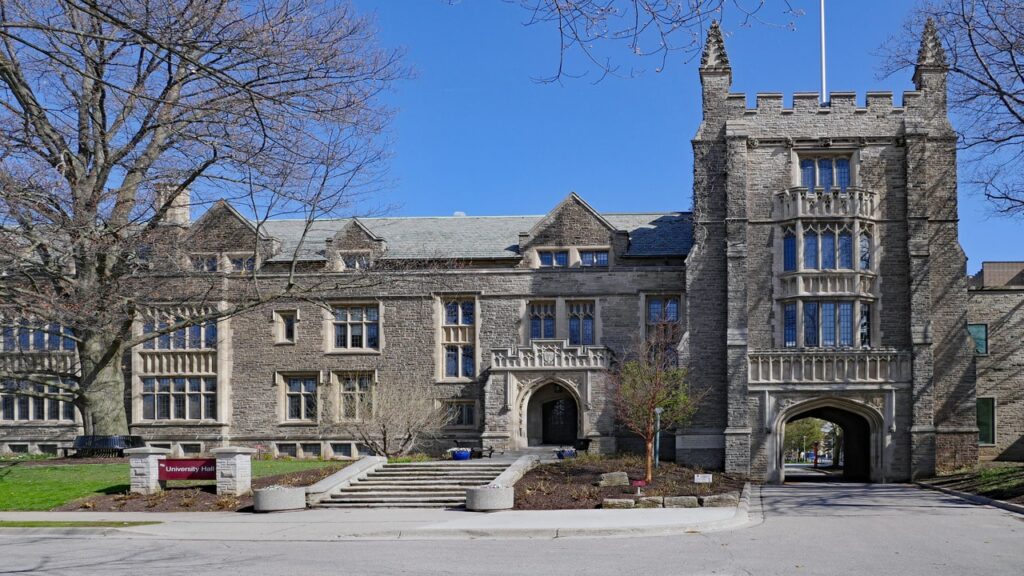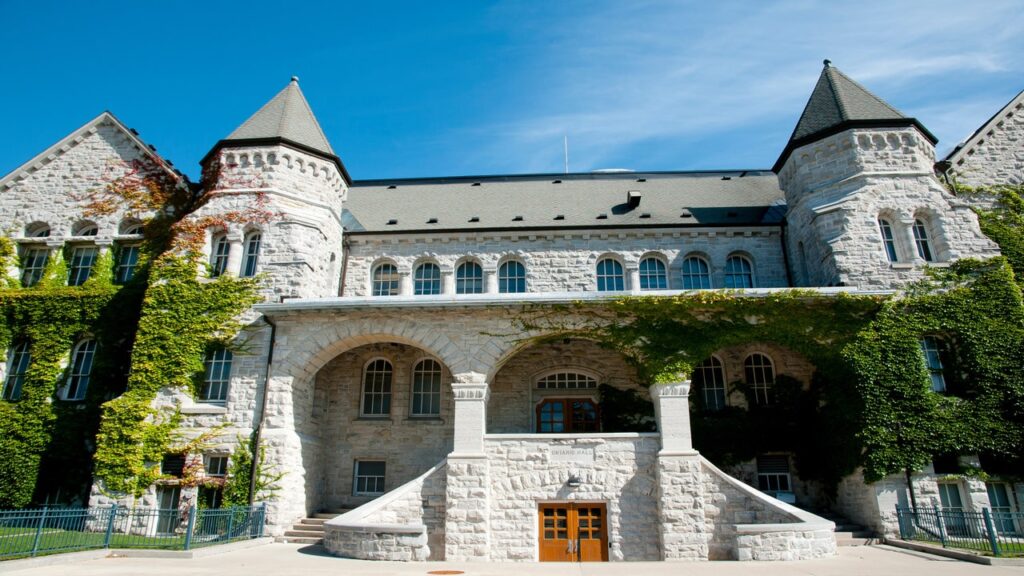A Masters in Chemical Engineering in Canada provides students comprehensive expertise in process design, thermodynamics, reaction engineering, and sustainable methodologies.
The program generally offers intakes in the fall (September) and winter (January) semesters. Some universities may have additional intakes in the spring or summer.
Upon graduating with a Masters in Chemical Engineering in Canada, you can expect an average salary ranging from CAD 60,000 to CAD 80,000 per year.
While tuition fees for Masters in Chemical Engineering in Canada can vary among universities, the average range is approximately CAD 15,000 to CAD 30,000 per year for domestic students and higher for international students.
This blog will discuss the top universities, course curriculum, job opportunities and all other essentials of pursuing a Masters in Chemical Engineering in Canada.
Universities and Fees for Masters in Chemical Engineering in Canada
University of Toronto
Check Your Eligibility for 80+ Universities across Canada
Book a free counselling session and find universities where you can get an Admission!

Check Your Eligibility for 80+ Universities across Canada

Book a free counselling session and find universities where you can get an Admission!

Ranked among the top Masters in Chemical Engineering in Canada programs worldwide, the University of Toronto offers cutting-edge research facilities, renowned faculty, and a strong industry network.
Its multidisciplinary approach and focus on innovation prepare students for an impactful career in Chemical Engineering.
| Application Deadline | March |
| Duration of Course | 2 years |
| Tuition Fee | CAD 28670 per year |
University of Waterloo

The University of Waterloo is known for its cooperative education program, providing students with valuable work experience alongside their studies.
With state-of-the-art laboratories and research opportunities, it offers a comprehensive chemical engineering curriculum and promotes industry connections.
| Application Deadline | February |
| Duration of Course | 2 years |
| Tuition Fee | CAD 15,392 per term |
McGill University

McGill University boasts a prestigious chemical engineering program emphasizing hands-on learning, sustainability, and entrepreneurship.
Its close proximity to industrial hubs offers students access to research collaborations and employment opportunities.
| Application Deadline | January |
| Duration of Course | 2 years |
| Tuition Fee | CAD 30,926 per semester |
University of British Columbia
The University of British Columbia’s chemical engineering program focuses on research excellence.
With strong ties to industry partners and a supportive academic environment, students gain valuable skills for successful careers.
| Application Deadline | February |
| Duration of Course | 2 years |
| Tuition Fee | CAD 23,913 per year |
University of Alberta
The University of Alberta’s chemical engineering program combines foundational knowledge with practical experience through its co-op program and industry internships.
Its faculty members are leaders in their fields, and students benefit from research opportunities and career development support.
| Application Deadline | April |
| Duration of Course | 2 years |
| Tuition Fee | CAD 20,035 per year |
McMaster University

McMaster University offers a comprehensive chemical engineering program on sustainability, bioengineering, and advanced materials.
It provides students experiential learning opportunities, great facilities, and collaborative research projects for real-world impact.
| Application Deadline | March |
| Duration of Course | 2 years |
| Tuition Fee | CAD 17,232 per year |
University of Calgary
The University of Calgary’s chemical engineering program encourages innovation, research, and industry collaboration.
With its strong ties to the energy sector, students gain expertise in areas such as oil and gas, renewable energy, and environmental sustainability.
| Application Deadline | March |
| Duration of Course | 2 years |
| Tuition Fee | CAD 15,000 per year |
Queen’s University

Queen’s University offers an outstanding chemical engineering program known for its research-intensive approach and experiential learning opportunities.
With a focus on sustainability and entrepreneurship, students develop the skills to address global challenges in areas such as energy, pharmaceuticals, and environmental engineering.
| Application Deadline | September |
| Duration of Course | 2 years |
| Tuition Fee | CAD 23,136 per year |
University of Ottawa
The University of Ottawa’s chemical engineering program combines theoretical knowledge with practical applications through hands-on projects and research opportunities.
Its faculty members actively engage in research, offering students a dynamic learning environment.
| Application Deadline | January |
| Duration of Course | 2 years |
| Tuition Fee | CAD 17,660 per year |
Western University

Western University’s chemical engineering program develops students’ critical thinking and problem-solving skills.
With a strong emphasis on research and industry collaborations, students comprehensively understand chemical engineering principles and their practical applications.
| Application Deadline | March |
| Duration of Course | 2 years |
| Tuition Fee | CAD 19,258 per year |
To better understand the colleges and their structure, talk to our expert counsellors!
Course Structure for Masters in Chemical Engineering in Canada
To give you an understanding of the curriculum typically consists of a combination of core courses, elective courses, and research components.
| Course Component | Description |
| Core Courses | Cover fundamental topics in chemical engineering, like thermodynamics, reaction engineering, transport phenomena, process control, and chemical kinetics. |
| Elective Courses | Specialization in specific areas of interest, like environmental engineering, pharmaceutical engineering, biochemical engineering, or materials science. |
| Research Component | This component involves conducting independent research under the guidance of a faculty advisor. |
| Seminars and Workshops | Provide opportunities for students to enhance their presentation and communication skills. |
| Co-op or Internship | Some programs may offer co-op or internship options, allowing students to gain practical work experience in industry settings. |
Note: The course structure may vary slightly depending on the specific university and program.
Employment Opportunities after Masters in Chemical Engineering in Canada
Process Engineer
As a process engineer, you will design, optimise, and implement chemical processes in oil and gas, pharmaceuticals, or manufacturing industries.
You will improve efficiency, safety, and quality in production processes.
Research Scientist
In this role, you will conduct advanced research to develop new materials, technologies, or processes.
You may work in research institutions, government agencies, or private companies, focusing on innovation and pushing the boundaries of chemical engineering.
Project Manager
As a project manager, you will oversee and coordinate various engineering projects, ensuring their completion within budget and timeline.
You will work closely with cross-functional teams, allocate resources, and manage project risks.
Environmental Engineer
With a focus on sustainability and environmental protection, you can work as an environmental engineer, addressing challenges related to pollution control, waste management, and sustainable energy.
You may be involved in developing eco-friendly processes and technologies.
Quality Control Engineer
In this role, you will ensure the quality and compliance of products or processes.
You will develop and implement quality control systems, conduct inspections, and analyze data to maintain high production standards.
Top Companies Hiring Masters in Chemical Engineering in Canada
- Suncor Energy
- Dow Chemical Canada
- Imperial Oil
- Shell Canada
- BASF Canada
- Procter & Gamble
- Hatch
- ExxonMobil Canada
- TransCanada
- Ontario Power Generation
Let’s also look at the average salary packages for Masters in Chemical Engineering in Canada:
| Designation | Average Salary (CAD) |
| Process Engineer | CAD 82,749 |
| Research Scientist | CAD 82,495 |
| Project Manager | CAD 86,193 |
| Environmental Engineer | CAD 65,253 |
| Quality Control Engineer | CAD 63,505 |
Final Thoughts
Canada’s robust education system, research infrastructure, and emphasis on innovation enrich the learning experience for students aspiring to study Masters in Chemical Engineering in Canada.
If you are looking for a Masters in Chemical Engineering in Canada, it is the best time to take a step forward and make your dream into reality.
Are you seeking additional assistance regarding scholarships for admission to prestigious universities for a Masters in Chemical Engineering in Canada?
Leap Scholar can offer you invaluable guidance on this matter.
We provide study-abroad counselling specifically designed for Indian students who aspire to enhance their careers through international education.
Schedule a complimentary session with our counsellors today!
Frequently Asked Questions
-
What is a Masters in Chemical Engineering in Canada?
A Masters in Chemical Engineering is a postgraduate degree that focuses on advanced knowledge and research in the field of chemical engineering.
-
What are the admission requirements for a Masters in Chemical Engineering in Canada?
Admission requirements may vary among universities but generally include a bachelor’s degree in engineering or a related field, letters of recommendation, a statement of purpose, and a competitive GPA.
-
How long does it take to complete a Masters in Chemical Engineering in Canada?
A Masters in Chemical Engineering in Canada takes around 1 to 2 years to complete, depending on the program and whether it is pursued full-time or part-time.
-
Are there scholarships available for Masters in Chemical Engineering in Canada?
Yes, many universities and external organizations offer scholarships, grants, and funding opportunities specifically for Masters in Chemical Engineering students.
-
Can I pursue a Masters in Chemical Engineering without a background in engineering?
It is generally preferred to have a bachelor’s degree in engineering or a related field to pursue a Masters in Chemical Engineering. However, some universities may offer bridging programs or alternative pathways for non-engineering graduates.
-
What specializations are available within the field of Chemical Engineering?
Specializations within Chemical Engineering may include process engineering, environmental engineering, biochemical engineering, materials engineering, and more.
-
How is the curriculum structured in a Masters in Chemical Engineering program?
The curriculum typically includes a combination of core courses, elective courses, research projects, and a thesis or a major project.
-
Can I work while pursuing a Masters in Chemical Engineering in Canada?
It is possible to work part-time while pursuing a Masters in Chemical Engineering in Canada, but it is important to consider the workload and time commitments of the program.
-
What research opportunities are available for Masters in Chemical Engineering students in Canada?
Canadian universities offer various research opportunities, including collaborations with industry partners, research centers, and academic faculty members.
-
What career prospects are available after completing a Masters in Chemical Engineering in Canada?
Graduates can find employment in diverse industries such as petrochemicals, pharmaceuticals, energy, environmental consulting, research and development, and more.
-
Are internships or co-op programs available during the Masters in Chemical Engineering program?
Many universities in Canada offer internships or co-op programs that provide students with valuable industry experience and networking opportunities.
-
Are there opportunities for international students to stay and work in Canada after completing their Masters in Chemical Engineering?
Yes, Canada provides various pathways for international students to work and gain experience after completing their studies, such as the Post-Graduation Work Permit (PGWP) program.
-
What is the average salary range for chemical engineers in Canada?
The average salary range for chemical engineers in Canada varies depending on factors such as experience, location, industry, and job responsibilities. Generally, salaries range from $60,000 to $100,000 or more per year.
-
What skills can I develop during a Masters in Chemical Engineering program?
Skills developed during the program include advanced knowledge in chemical processes, problem-solving abilities, analytical skills, research techniques, project management, and teamwork.
-
Can I pursue a PhD after completing a Masters in Chemical Engineering in Canada?
Yes, completing a Masters in Chemical Engineering can serve as a stepping stone for those interested in pursuing a PhD and further advancing their research and academic careers.







